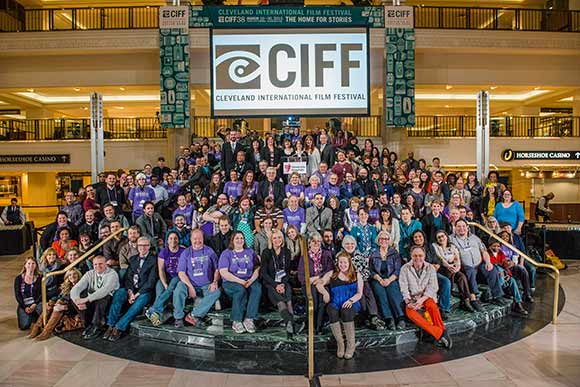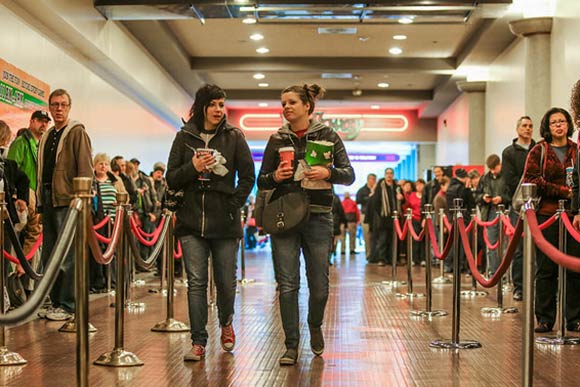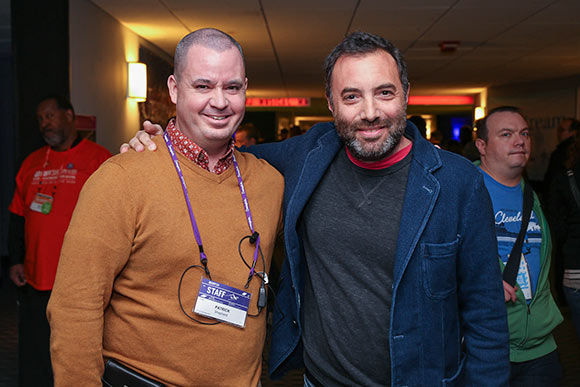Movies, movies, everywhere: A guide to surviving and thriving at the film fest
Looking back on her first time at the Cleveland International Film Festival, Crystal Angersola is amazed she managed to see a movie at all.
She didn’t plan much ahead or buy her tickets in advance. She just waltzed right in, thinking she’d buy a ticket, grab some popcorn and walk into the film she wanted to see.
She did -- eventually. But getting there was a little different than she imagined.
“I got to Tower City,” she recalls, “and there were all these lines of people and schedules on the walls and I was like, ‘Ahhhhhh! What do I do?’”
A volunteer guided Angersola to the box office. The movie she wanted to see was on standby -- oh no! -- but the clerk encouraged her to buy a ticket anyway. She joined a line of other hopefuls waiting for admittance.
Fortune was with her. A few minutes later she was inside the theater, happy to have reached her destination even if she was unsure exactly how she’d done it.
Angersola’s zigzag of emotions that day is one every festival attendee -- novice or expert -- has likely experienced: Excitement, overwhelm, despair, jubilation.
Veterans will tell you that’s part of the fun of the event, now in its 39th year. Between its opening on March 18 and its close on March 29, the festival will show more than 300 feature and short films and welcome an estimated 100,000 moviegoers to theaters at Tower City and 10 neighborhood locations. The people who tend to enjoy themselves most are the ones who surrender to the event’s popularity and size.
But just in case you’re new to the festival, or find the idea of navigating its riches overwhelming, never fear! We’ve consulted a handful of veteran attendees, volunteers and festival staff for tips on how to survive -- and thrive -- at this year’s event.
 Ciff feature film, Next to Her
Ciff feature film, Next to Her
Choosing Films
This year’s festival guide runs just shy of 200 pages. Cracking it open can feel like a commitment on par with starting a particularly complex novel. How do you manage the abundance without giving up and running for the nearest Hollywood cineplex?
Narrow your choices.
The best way to manage the “sensory overload” of the guide, says Patrick Shepherd, the festival’s associate director, is to reduce your options right off the bat. For example, you can focus on one of a number of “Sidebar” categories -- e.g. Family Films, 10% Cinema (LBGT films), African Diaspora, Cinema en Español. The guide also indexes films by country, making it easy to pick out films from, say, your ancestral homeland.
Limiting by schedule can also vastly whittle your choices. “Find a time you’re available and pick something then,” says Robert Kellner, who’s been volunteering at the festival for the past three years. “Don’t even bother reading about stuff you can’t take time off to see.”
Watch trailers online.
The festival website (http://www.clevelandfilm.org) features trailers for almost all films. “Trailers give you a real vibe for the movie, beyond anything you can read,” says Angersola, who’s been attending the festival every year since her first disorganized attempt. “I’ve seen some real stinkers that I wouldn’t have chosen if I’d watched the trailer beforehand.”
 Ciff feature film,The Keeping Room
Ciff feature film,The Keeping Room
Go all mathematical.
If you’re serious about maximizing your time, fire up your computer and start a spreadsheet. Jason Stone, who’s been attending the festival since 1998 and is an all-access Movie Mogul passholder, makes a list of all the movies he can attend by time, then groups them into three categories: Absolutely Want to See, Could See, and Won’t See. “Then, if there’s one I’m definitely seeing, it knocks others playing against it out of contention,” he says. “So it’s a big process of elimination.”
Tune into the buzz.
Checking out social media and Googling around can give you a real sense of a movie’s buzz, says Jen Vinson, a movie marketing professional who’s worked with the festival since the early 1990s. Once the festival’s in progress, you can also jump onto the festival’s Twitter feed or Facebook page and see which films moviegoers are loving.
Avoid overscheduling.
For beginners, overestimating the number of movies they can or want to see is a common pitfall, says Angersola. Scheduling a zillion movies in one day may sound like a party when you’re in the planning stages, but the reality may be a slog. “One time I saw five movies on a Saturday and I wanted to kill myself,” says Angersola. “One a day on the weekdays and three on weekends is my limit.”
Don’t choose at all! Just go!
If you’re not a planner, don’t buy tickets or research the films at all -- just show up and see what’s available once you arrive. “This might be the best remedy for the stress involved in trying to plan a visit,” Kellner says. “Often, the best films you see are happy accidents anyway.” Just about every veteran festival-goer concurred: Some of their favorite movies have been ones they hadn’t intended to see at all.
 Ciff feature film, Who Am I
Ciff feature film, Who Am I
Buying Tickets
You can buy advance tickets on the festival’s website, which is kept up to date with standby status, additional screenings of popular films and other information. Tickets are also available at the Tower City box office during the festival. They cost $13 for members and $15 for non-members.
Buy your tickets as early as possible.
The festival sells general admission tickets on a first-come, first-served basis, so it’s important to buy early for movies you really want to see.
Remember that standby is not death!
When the festival sells all available advance tickets to a movie, that movie is listed as being on “standby.” That doesn’t mean you should despair: On average, according to festival staff, 80 percent or more of standby ticket holders gain admittance to their desired movie. To buy a standby ticket, you need to show up at the box office at least an hour in advance of the screening time.
Consider buying a CIFF membership or a festival pass.
CIFF memberships and festival passes give you early or special access to films. The early-buying window for members has already passed, but if you’ve got the cash you can still buy a pass that, depending on the level you choose, lets you see as many movies as you want, when you want.
If you’re crowd-averse, go at an “off” time or to a neighborhood screening.
Veteran attendees say relaxing into the organized chaos of the festival is part of the fun (see below). But if you really can’t stomach crowds and lines, consider going at off-peak times. Weekend nights are busiest, followed by weekday nights and weekend days. The first week of the festival tends to be calmer than the second. “The second weekend’s probably the most hectic because everyone’s trying to cram something in at the last minute,” Kellner says.
Neighborhood locations elsewhere in the city and suburbs also tend to be calmer than the hub at Tower City, Shepherd says. There are 10 neighborhood screenings this year, ranging from Akron to Chagrin Falls to Gordon Square. Check the website for showtimes.
 Ciff feature film,The Look of Silence
Ciff feature film,The Look of Silence
Getting There
Go with a friend who knows what they’re doing.
An experienced buddy can help you navigate the festival’s intricacies, Stone says. Watch out, though: If you go with a true festival fanatic, you may catch the bug yourself. “I started going with a pair of friends who bought passes and would spend the whole day at the festival,” he says. “At first I thought they were crazy, but they kept talking about how fun it was. When I tried it myself, I got hooked.”
Or go with a friend who doesn’t, but is fun anyway.
Angersola makes her festival visits into friends’ gatherings. “It’s really practical to go with a friend, because then you have someone to hold your spot in line when you need to go to the bathroom or whatever,” she says. “But it’s also just more fun: Then you have someone to talk about the movie with afterward.” (But also see below -- the festival can also be a great place to make new friends.)
Leave the car at home and take transit or ride your bike.
Limited parking spaces are available in the Tower City garage for $3 with validation, but they fill up quickly especially on weekends -- and are at more of a premium than ever with the growth of downtown Cleveland. The festival takes place two floors above the city’s main transit hub at Tower City, so riding RTA Rapid trains can save you the time and hassle of parking. RTA even has a web page especially for festival attendees: www.riderta.com/ciff. Bicyclists can leave their bikes at the nearby Bike Rack (http://www.clevelandbikerack.com).
Arrive early.
How early? At least an hour before showtime if you’re hoping for a standby seat. Even if you already have a ticket, Angersola recommends getting there 45 minutes early on the weekends and 30 minutes on weekdays so you can queue up for decent seats. Passholders must arrive at least 20 minutes before showtime, but even they are not guaranteed seats: Only about 100 seats per theater are reserved for passholders.
 Ciff feature film, They Have Escaped
Ciff feature film, They Have Escaped
Life Inside the Festival
Once you’re at Tower City, you enter into a kind of separate, film festival ecosystem. Here are some tips for surviving in the wilds.
Talk to strangers!
Plenty of people have made new friends -- and in a few cases, future spouses! -- by striking up conversations with other moviegoers. Especially in line, “there’s a real sense of camaraderie,” says Vinson. “It’s a great time for people to chat about what they’ve seen and heard, and what they’d recommend.”
Pack some healthy snacks.
It’s great to support the cinema concession counter and surrounding restaurants, both inside and outside Tower City. But veteran festivalgoers recommend packing some healthy snacks to keep you going, especially if you’re planning on seeing multiple films at a stretch. Fruits such as grapes and apple slices are favorites, as are granola bars. “Something not too crunchy where you’re going to annoy people,” Angersola says. Stone even pops a few B vitamins before a long day downtown to give him an extra energy boost.
Beware of carbs and caffeine.
Tempting as it may be to go on a espresso or sugar binge to get you through a long day at the movies, you’ll likely pay for those artificial highs with a crash later on. Caffeine also dehydrates you, which can lead to headaches.
 Ciff feature film, Purgatory
Ciff feature film, Purgatory
Dress in layers.
Air temperatures inside the cinemas range from chilly to burning hot, so wear tops you can easily slip on or off. “I always wear a hoodie,” Stone says. Vinson, meanwhile, warns against wearing a bulky coat if at all possible, because it’ll be a pain to lug around with you.
Step out for fresh air, daylight and a bit of exercise.
If you’re seeing multiple films, take a minute to pop upstairs and get some natural daylight. And even if it’s cold out, “force yourself to get outside Tower City every once in a while to remind yourself there’s a real world out there,” Vinson says with a laugh. These little snatches of exercise also help keep your blood moving and your mind sharp.
Enjoy downtown!
In case you haven’t heard, downtown’s pretty cool these days. Don’t forget to check it out by grabbing a meal somewhere or just walking around. Some folks even take a staycation, booking a downtown hotel so they have extra time to explore the city.
Most important of all: Embrace the experience.
Hectic as the festival can be, “Remember that what you’re seeing is a lot of people making the investment to see these films,” Stone says. “And that energy is what brings people back every year and it’s what makes filmmakers submit their films.” Others concur: A bit of confusion and busyness is a small price to pay for the chance to experience stories you might otherwise never see.











